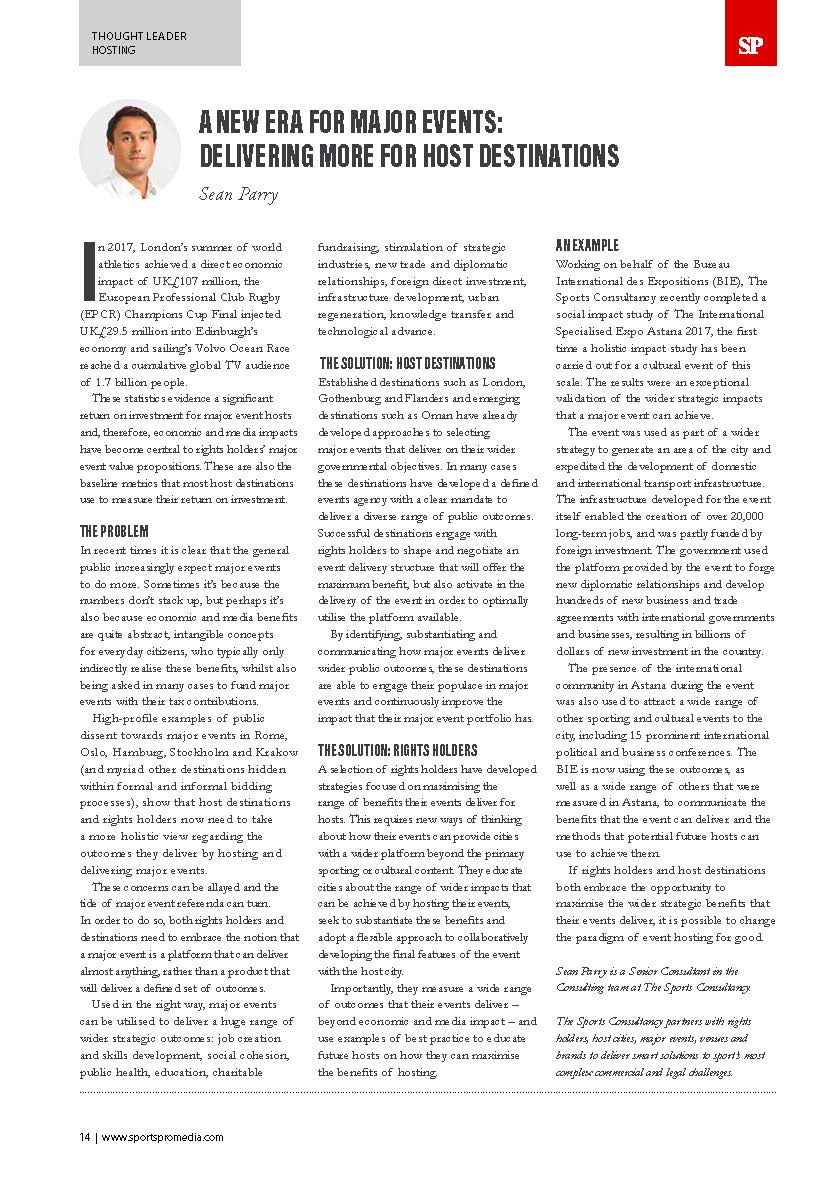Thought Leader Jan 18 – Sean Parry
In 2017, London’s summer of world athletics achieved a direct economic impact of UK£107 million, the European Professional Club Rugby (EPCR) Champions Cup Final injected UK£29.5 million into Edinburgh’s economy and sailing’s Volvo Ocean Race reached a cumulative global TV audience of 1.7 billion people.
These statistics evidence a significant return on investment for major event hosts and, therefore, economic and media impacts have become central to rights holders’ major event value propositions. These are also the baseline metrics that most host destinations use to measure their return on investment.
THE PROBLEM
In recent times it is clear that the general public increasingly expect major events to do more. Sometimes it’s because the numbers don’t stack up, but perhaps it’s also because economic and media benefits are quite abstract, intangible concepts for everyday citizens, who typically only indirectly realise these benefits, whilst also being asked in many cases to fund major events with their tax contributions.
High-pro le examples of public dissent towards major events in Rome, Oslo, Hamburg, Stockholm and Krakow (and myriad other destinations hidden within formal and informal bidding processes), show that host destinations and rights holders now need to take a more holistic view regarding the outcomes they deliver by hosting and delivering major events. These concerns can be allayed and the tide of major event referenda can turn. In order to do so, both rights holders and destinations need to embrace the notion that a major event is a platform that can deliver almost anything, rather than a product that will deliver a de ned set of outcomes.
Used in the right way, major events can be utilised to deliver a huge range of wider strategic outcomes: job creation and skills development, social cohesion, public health, education, charitable fundraising, stimulation of strategic industries, new trade and diplomatic relationships, foreign direct investment, infrastructure development, urban regeneration, knowledge transfer and technological advance.
THE SOLUTION: HOST DESTINATIONS
Established destinations such as London, Gothenburg and Flanders and emerging destinations such as Oman have already developed approaches to selecting major events that deliver on their wider governmental objectives. In many cases these destinations have developed a defined events agency with a clear mandate to deliver a diverse range of public outcomes. Successful destinations engage with rights holders to shape and negotiate an event delivery structure that will offer the maximum benefit, but also activate in the delivery of the event in order to optimally utilise the platform available.
By identifying, substantiating and communicating how major events deliver wider public outcomes, these destinations are able to engage their populace in major events and continuously improve the impact that their major event portfolio has.
THE SOLUTION: RIGHTS HOLDERS
A selection of rights holders have developed strategies focused on maximising the range of benefits their events deliver for hosts. This requires new ways of thinking about how their events can provide cities with a wider platform beyond the primary sporting or cultural content. They educate cities about the range of wider impacts that can be achieved by hosting their events, seek to substantiate these benefits and adopt a exible approach to collaboratively developing the nal features of the event with the host city.
Importantly, they measure a wide range of outcomes that their events deliver – beyond economic and media impact – and use examples of best practice to educate future hosts on how they can maximise the bene ts of hosting.
AN EXAMPLE
Working on behalf of the Bureau International des Expositions (BIE), The Sports Consultancy recently completed a social impact study of The International Specialised Expo Astana 2017, the first time a holistic impact study has been carried out for a cultural event of this scale. The results were an exceptional validation of the wider strategic impacts that a major event can achieve.
The event was used as part of a wider strategy to generate an area of the city and expedited the development of domestic and international transport infrastructure. The infrastructure developed for the event itself enabled the creation of over 20,000 long-term jobs, and was partly funded by foreign investment. The government used the platform provided by the event to forge new diplomatic relationships and develop hundreds of new business and trade agreements with international governments and businesses, resulting in billions of dollars of new investment in the country.
The presence of the international community in Astana during the event was also used to attract a wide range of other sporting and cultural events to the city, including 15 prominent international political and business conferences. The BIE is now using these outcomes, as well as a wide range of others that were measured in Astana, to communicate the benefits that the event can deliver and the methods that potential future hosts can use to achieve them.
If rights holders and host destinations both embrace the opportunity to maximise the wider strategic benefits that their events deliver, it is possible to change the paradigm of event hosting for good.
Sean Parry is a Senior Consultant in the Consulting team at The Sports Consultancy.

